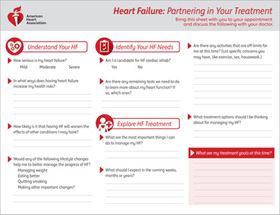Your Heart Failure Health Care Team

If you have heart failure, it’s important to develop good relationships with all members of your health care team. Talk to them openly and honestly. Keep them informed about symptoms or changes in your condition so that they can help you. And follow their recommendations to manage your condition and have a full, active life.
Download Partnering in your treatment: questions to ask your doctor (PDF).
Your health care team may include:
- The primary care doctor is usually a general internist or family physician who provides your routine preventive health care (including physical exams and basic tests). This person is the first contact when medical problems arise. In most cases, he or she remains in charge of your overall care and is your main contact for questions and advice.
- A cardiologist diagnoses and treats heart problems.
- Other doctors include surgeons and other specialists, if recommended by the primary care doctor or cardiologist.
- Clinical nurse specialists, nurse practitioners and physician assistants may perform tests and provide care, education and counseling.
- Physical and occupational therapists assist with cardiac rehabilitation and help develop an appropriate plan for regular physical activity.
- Dietitians share heart-healthy eating guidelines and help develop meal plans.
- Mental health professionals help patients and families deal with emotional stress, anxiety or depression.
- Social workers and case managers can help with complex financial, legal and other issues, such as insurance coverage, developing an advance directive and finding social support services.
- Pharmacists are an excellent resource for information about your medications. They can advise you if one of your drugs interacts badly with certain foods or with other drugs, including nonprescription ones. They can also help you understand patient-directed package inserts and label instructions for medications.
You’re also an important member of the health care team
You and your caregivers are both essential parts of the health care team. It’s your responsibility to follow the health care team’s instructions. It’s also up to you to tell them how you're doing. With good teamwork and communication, you can improve your quality of life.







